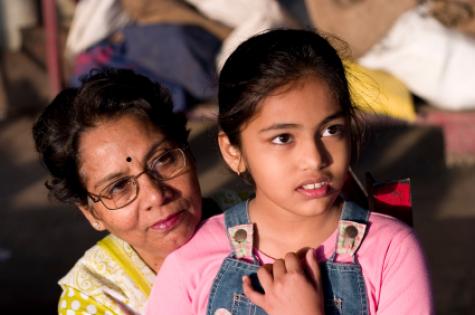Just as New South Wales is set to celebrate ‘Grandparents Day’ this Sunday, new research published in the British Biological Society’s journal demonstrates how important grandmothers are to evolution (sorry grandad).
The ‘grandmother hypothesis’ was first developed in 1997 by scientists in the United States who had noticed that older women in hunter-gatherer communities in Tanzania spent their time gathering food for their grandchildren. Other primates, such as apes, gather their own food after weaning.
But until the now, the hypothesis was just that.
With the help of funding from the Australian Research Council and the National Science Foundation, researchers led by Professor Kristen Hawkes, Distinguished Professor of Anthropology of the University of Utah developed computer simulations through which they tested the impact of ‘grandmothering’ on life expectancy. The study simulated evolution over time with the question: ‘If you start with a life history like the one we see in great apes – and then you add grandmothering, what happens?’
The research team, which included Dr Peter Kim from Sydney University, measured the change in adult average life span ranging from that of a chimp who lives to an average of 28-30 years to a human in developed nations who lives to an average in the early 80s. The simulation accounted for improved conditions due to clean water, sewerage systems and other public health measures, as well as a series of conservative assumptions about ‘being’ a grandmother and care patterns. It begins with only 1 per cent of women living to grandmother age and able to care for grandchildren, but by the end of 24,000 to 60,000 years (a relatively short timeline in evolution), the results are similar to those we know: about 43 per cent of adult women are grandmothers.
“Grandmothering was the initial step toward making us who we are,” Professor Hawke says.
Professor Hawkes acknowledges a competing ‘hunting hypothesis’ which holds that as natural resources declined, there was natural selection for humans with larger brains who were smarter about hunting for food. The larger brains led to longer life spans.
But Professor Hawkes says the computer simulation ignored brain size, hunting and pairing and that, even at its most conservative, the simulated creatures evolved from chimp longevity to human longevity.
She believes the shift to longer adult life span caused by grandmothering “... is what underlies subsequent important changes in human evolution including increasing brain size.”
"If you are a chimpanzee, gorilla or orang-utan baby, your mother is thinking of nothing about you. But if you are a human baby, your mother has other kids she is worrying about.
“Grandmothering gave us the kind of upbringing that made us more dependant on each other socially and prone to engage each other’s attention.”
According to Hawkes, this gives rise to “a whole array of social capacities” that are the foundation of distinctly human traits – some of which are still evolving - such as learning new skills, bonding, cooperation and collaboration.
All that, and babysitting too.








 Agree (0)
Agree (0) Disagree (
Disagree (









__small.png)










